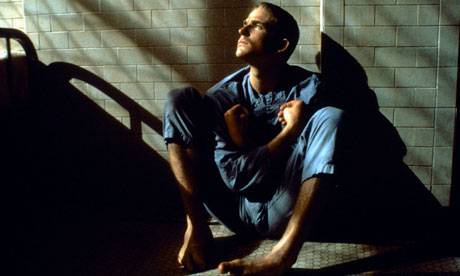
The graphic and often painful memoirs of celebrated American author William Wharton – which include an account of his role in the killing of German prisoners during the second world war – are to be published for the first time in English.
Wharton's first novel, Birdy, was an instant bestseller and was turned into an award-winning film by director Alan Parker. Despite the critical acclaim that greeted subsequent books and a legion of admirers that included the Nobel laureate Doris Lessing, he has been largely out of print in the UK. He died in 2008.
Now his war memoirs are to be published in English for the first time, along with his complete works – eight novels and two non-fiction books. Curiously the memoir, entitled Shrapnel: Tales Not Told, had been quietly published only in Polish, in the country where he had somehow retained popularity. It includes memories so painful he could not share them with his four children. Among them was his indirect involvement in killing German prisoners of war in his charge. He writes: "I still have a hard time facing up to it inside myself. I'm having a hard time trying to get myself to write it. I guess that's why I put it off till last. I want to tell it as honestly as possible."
Scott Pack from HarperCollins, which begins publishing the books this summer, described the war memoir as "one of the finest" he has read. He could not believe it had languished forgotten for so long.
Having joined the army after school, Wharton survived D-day and the long campaign across France and the Low Countries, despite being seriously wounded in the Battle of the Bulge. A carpenter's son from "a poor, hard-working, ignorant Catholic family in Philadelphia", as he once put it, Wharton later studied art at the University of California and moved to Paris, where he lived with his family on a houseboat, selling expressionist paintings.
In 1978, aged 53, he published Birdy, a Kafkaesque story of a wounded soldier, traumatised by the war, who takes refuge in the world of birds, prompting the British writer John Fowles to describe him as "exceptionally gifted". Two other novels were made into films, one with Jack Lemmon.
Pack developed a passion for Wharton's writing as a teenager. Parker's 1984 film inspired him to read all of Wharton's books. When he became a publisher, he resolved to bring the neglected writer to a new generation. "He's one of my all-time favourite writers," he said. "I'm a fan of writers who are great storytellers. I'm not a fan of people like Salman Rushdie or Martin Amis, who are great linguists and I think show off. I realise they're hugely acclaimed and have won lots of prizes, and that's fine, but personally I want a storyteller."
Pack's enthusiasm led him to Wharton's agent, who told him: "There's this unpublished memoir, do you want to take a look?"
In its introduction, Wharton relates: "One evening … I had dinner with Kurt Vonnegut [writer of Slaughterhouse Five]. He asked me, 'How was your war?' I flippantly responded by recounting the … court martials in which I'd been involved … War for me, though brief, had been a soul-shaking trauma. I was scared, miserable, and I lost confidence in human beings, especially myself.
"When dug up, the buried guilts of youth smell of dirty rags and old blood. There are many things that happened to me, and because of me, of which I am not proud, events impossible to defend now; callousness, cowardice, cupidity, deception."
He recalls Germans whom his men had captured being shot in the legs before they were executed, arguably in revenge for an SS massacre of American soldiers at Malmédy in Belgium. He describes a German pulling out his family photo and crying. He writes: "Some of [the Americans] are feeling guilty about it all, but the worst of them are proud of themselves, consider themselves avenging patriots." He remembers vomiting when soldiers dug the Germans from shallow graves where their executioners had hidden them. On being told by the Observer of Wharton's revival, Alan Parker told the Observer: "He's terribly underrated and I was astonished his books were out of print for so long. Not many authors have three films made from their books. He eschewed the literary celebrity thing, which was not his personality at all. The film was fortunate enough to get a prolonged standing ovation. Sitting next to me, he was most embarrassed at the success."

